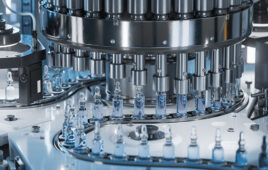
[Image courtesy of Sergey Nivens/Adobe Stock]
While U.S. leads in total biotech funding, Chinese biotech companies, on average, saw larger funding rounds than either Europe or the U.S. The average funding size per company in China was roughly three times larger than that in the U.S. and six times larger than the average in Europe.
But while China-based companies had larger hauls, they were comparatively few. Chinese biotech secured in cumulative $20.61 billion among just 69 firms, with roughly $299 million in funding per company on average. Meanwhile, the 229 European biotech firms that won funding in the past year attracted $11.46 billion in funding, averaging $50 million each. In comparison, the 583 U.S. biotech companies with recent funding attracted $56.79 billion, averaging $97 million per company.
The map below represents the total biotech funding amount in USD across the globe. Funding amounts are shaded based on companies’ cumulative funding totals and density. Darker shades indicate higher funding amounts and density, with the U.S. hubs on the East and West Coasts showing the darkest shade, reflecting the combination of total funding and density.
Cambridge: A biotech powerhouse with resilience amid challenges
While Cambridge is part of the Greater Boston metro area, the city stands on its own as a life sciences industry hub. In 2023, 72 biotech companies in the city attracted a whopping $7.26 billion in funding despite the overall slowdown in biotech funding. This translates to an average funding per company of $100.88 million. In the negative column, greater Boston also saw an increase in biotech startups shutting down, with at least 17 closures since the start of the year.
San Francisco: A hub with high volume but lower average funding
The city by the Bay was home to 41 companies that jointly attracted $2.65 billion. Despite the city's substantial biotech presence, the average funding per company, $64.51 million, was lower compared to some other hubs. One potential reason for the relative funding lag is the collapse of Silicon Valley Bank, a notable investment banker in biotech.
San Diego: Securing large rounds despite a sluggish VC ecosystem
The SoCal city's 32 biotech companies attracted $3.28 billion in funding, with an average of $102.45 million per company. This indicates that companies in San Diego are securing larger funding rounds, on average, compared to many of their counterparts. But while San Diego's biotech companies recorded significant fundraising rounds and exits, the San Diegan venture capital ecosystem remained sluggish overall.
Boston and New York: East Coast rivals attract biotech funding amidst
Boston's 31 companies attracted $2.98 billion in total funding, with an average of $95.99 million per company. New York was close behind with 30 companies and total funding of $2.91 billion, averaging $96.96 million per firm.
Boston's biotech sector is usually stronger, and in 2023, many blocks of new lab space remained vacant. Despite the headwinds, AI-driven innovation in the city continued to attract funding, with Nimbus Therapeutics attracting $210 million in September to further its tech-enabled small molecule medicines using a proprietary drug discovery engine. Additionally, Asimov raised $175 million in January to provide pharmaceutical and biotech companies synthetic biology tools and systems.
In New York, the biotech sector has recently profited from regulatory changes aimed at stimulating growth. In December 2023, New York City Mayor Eric Adams signed legislation reinstating tax credits for biotech companies. The legislation, which is effective until January 1, 2026, provides a tax credit of up to $250,000 per year for eligible companies, with a total annual cap of $3 million. The tax credit aims to incentivize small life sciences companies to create jobs and increase investment in the city. The biotech industry in New York City currently employs more than 20,000 people, and the city aims to double this number in the next 10 to 15 years.
Paris: Europe's biotech beacon grows up
The French capital, with 18 companies, achieved total funding of $1.58 billion and an average of $87.92 million per company. The city has attracted talent and maturing as a health-technology hub, as Nature has noted, with the number of health-technology companies growing from 2,050 to 2,640 between 2020 and 2022. Each year, Nature ranks institutions and countries based on the number of scientific articles and papers published in high-quality journals. In its 2021 index, researchers at institutions in the Paris metro area accounted for 44% of France’s total research output and for 48% of its output in the biological sciences.
Shanghai: A robust biotech ecosystem with high average funding
Shanghai also had 18 companies but boasted a total funding of $3.72 billion. The high average funding per company of $206.72 million points to larger funding rounds. In 2023, Viva Biotech closed a funding round worth $210 million, with participation from Temasek, Highlight Capital (HLC), and True Light. In recent years, China has made moves to expand its biotech scope to produce gene therapies, cell-based therapies, and antibody-drug conjugates. Although increasing U.S. sanctions are a hurdle, the sector's growth remains evident with AstraZeneca's agreement to acquire Chinese cell therapy developer Gracell Biotechnologies Inc. for as much as $1.2 billion.
Singapore and London: Thriving ecosystems navigate the funding climate
While Singapore and London rank among the top 10 in terms of the number of companies, they show potential for growth in average funding per company. Singapore was home to 17 companies with a total funding of $947 million and an average of $55.71 million per company. The nation-state has actively worked to become a global biotech hub since 2000, focusing on expanding its prowess in R&D, biopharma manufacturing, and commercial operations.
Meanwhile, London experienced a resurgence in 2023, with the June to August time period emerging as the best quarterly total since 2021, according to Clarivate. According to Crunchbase data, 16 companies there secured total funding of $408 million, with an average of $25.51 million per company. While these cities rank among the top 10 in terms of the number of companies, they show potential for growth in average funding per company.
Seattle: An emerging West Coast biotech hub gains ground
Seattle, with 16 companies, achieved total funding of $1.17 billion and an average of $73.17 million per company. In 2023, Pfizer's $43 billion acquisition of Seagen, a Seattle-based biotech company, was a major event. Seagen's expertise in antibody drug conjugates (ADCs) and its large pipeline of early programs make it a key player in the Seattle biotech scene. Such major acquisitions can stimulate growth and investment.
Another notable development was the funding of a new Seattle biotech organization to the tune of $75 million to research "DNA typewriters," self-monitoring cells that could advance the field of synthetic biology. This initiative, called the Seattle Hub for Synthetic Biology, is a collaboration between the University of Washington, the Chan-Zuckerberg Initiative, and the Allen Institute
Filed Under: Biotech, Cell & gene therapy, Drug Discovery and Development, machine learning and AI



